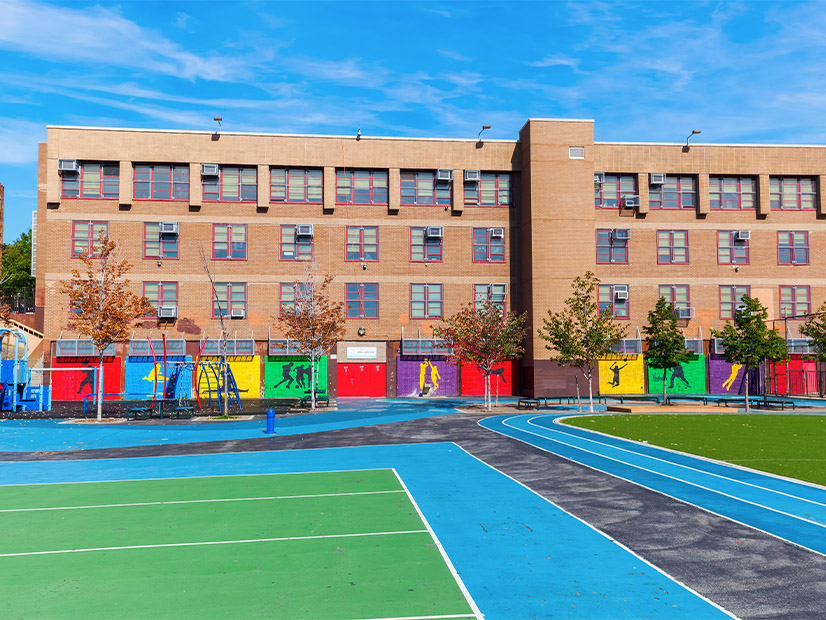
New York’s Black, Puerto Rican, Hispanic and Asian (BPHA) Legislative Caucus wants to create a pathway for young adults to enter the energy and environment workforce through a program to make the state’s schools clean and resilient.
“School buildings are some of the highest polluters in our state,” Rep. Kenny Burgos said on Monday during a BPHA Caucus webinar on priorities for the next New York budget.
The 68-member caucus is proposing New York create a healthy school buildings program to support the goals of the Climate Leadership and Community Protection Act (CLCPA). The program would help young people acquire entry-level jobs retrofitting schools to transition away from fossil fuel and prepare them to withstand the stresses of climate change.
“Our schools need infrastructure updates that are going to create thousands of green jobs … and help bring money back to our communities,” Burgos said.
The program would emphasize investments in schools in marginalized and disadvantaged communities and supporting young people from those communities in job placement.
Gov. Kathy Hochul unveiled a $59 million initiative last fall to improve indoor air quality in pre-K-12 schools in disadvantaged communities. The program, which is slated to launch early this year, will provide the technical support schools need for energy efficiency and clean heating and cooling projects.
Hochul will release her full budget proposal this week, then move into budget negotiations with legislators before a final vote this spring. The school buildings program is one of 15 budget priorities the caucus is proposing for climate action, environmental justice and energy.
To further emission reductions in the state’s buildings sector, the caucus is supporting the All-Electric Building Act (S6843A) co-sponsored by caucus member Sen. Jabari Brisport. The bill would require municipalities to deny permits for new residential or commercial building construction if they are not all-electric, effective in 2024.
Climate Bills
One of the caucus’ top priorities is a bill that would establish a carbon tax to fund state climate investments.
“We’re proposing to meet the very strong, landmark goals of the [CLCPA] by mandating New York prioritize investments for up to $15 billion for well-paid jobs across the state, with 40% of these investments flowing to disadvantaged communities and workers most impacted by the pollution intensive fossil fuel economy,” Burgos said.
The Climate and Community Investment Act (S4264A), sponsored by caucus member Sen. Kevin Parker, would authorize the state to establish a fee for entities that emit greenhouse gases. Supporters of the bill estimate the fee could raise $10 billion to $15 billion over 10 years.
Also on the caucus’ priorities list are bills to end fossil fuel subsidies and expand the New York Power Authority’s ability to build renewable generation.
The Fossil Fuel Subsidy Elimination Act (S4816) would repeal $330 million in tax exemptions provided by the state to the fossil fuel industry. The bill, according to the caucus, would eliminate certain exemptions to the sales and use tax and the petroleum business tax.
The New York Build Public Renewables Act (S6453), sponsored by Parker, would eliminate the cap on the New York Power Authority’s portfolio of clean generation assets. Currently, NYPA cannot own more than six generation facilities at 25 MW each, which the caucus says is a “huge limitation.”
Adirondacks and Equity
The caucus also proposed celebrating New York’s Adirondack Park as a “cradle of the early civil rights movement” through the intersection of climate science education and environmental justice.
Adirondack Park is a 6-million-acre protected area of New York that includes forest preserves and private land, where Burgos says some communities are disproportionately affected by climate change.
One initiative would highlight an early suffrage settlement in the Adirondack Park, called Timbuctoo, where Black men received property that enabled them to vote. The Timbuctoo Pipeline would create a summer climate and careers institute through a partnership between Medgar Evers College and the State University of New York College of Environmental Science and Forestry.
The initiative “will help create an exploration of intersectional careers and address systemic issues of access to the Adirondack Park from an equity and justice perspective,” the caucus said.


